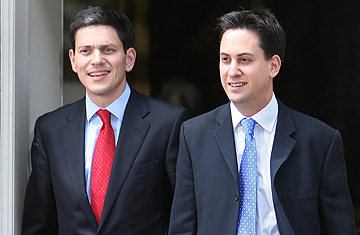
David Miliband, left, leaves Number 10 Downing Street with his brother Ed Miliband
There's a fine line between tragedy and comedy — except in British politics, where the two elements have been hopelessly commingled since the May 6 elections. Scarcely had tears dried after the heroically flawed Gordon Brown's poignant farewell speech, when along came a cheery double act called Cameron 'n' Clegg, Britain's new coalition leaders who cracked jokes as they promised the country painful austerity measures. But it's the latest drama around the competition to succeed Brown at the helm of the Labour party that carries the most potential for human tragedy — or monumental farce. The first two declared candidates for the party's top job aren't simply fraternal members of the same party, they're brothers, David and Ed Miliband. "Get eight more family members to stand and you'll have a Centiband," quipped one wag on Twitter. "Brotherly love will survive," said David, the 44-year-old former Foreign Secretary, who is the older and by traditional measures more qualified of the two.
But will it? A long power struggle between Labour's last two leaders, Brown and his predecessor Tony Blair — once deemed to be as close as any blood brothers — corroded both men's judgment and helped contribute to the party's ouster earlier this month. Ed Miliband, 40, and the former Climate Change Secretary, acknowledged this poisonous history as he announced his own candidacy at a meeting of a leftwing think-tank, the Fabian Society, on May 15. Blair stood down as Prime Minister in 2007 and Brown took his place, but Brown believed Blair had reneged on a deal to step aside years earlier. "No deals," said Miliband E, brushing aside the notion it might be better for Labour, and the Miliband family, if he and Miliband D agreed not to run against each other. "Deals are the thing that got us into some of the problems we have had." He added "David is my best friend in the world. I love him dearly and I think it is absolutely possible and necessary for this party to have a civilized contest."
Anyone who has observed the brothers at work will know that their relationship is not without strains and jealousies, which the forthcoming contest can only exacerbate. But it's also true that many Labour insiders are anxious to see as many strong candidates as possible enter the fray. They believe the failure to stage a leadership contest after Blair's departure undermined Brown's authority, and his tenure was marked by challenges and rumored coup plots within the party. Several of these envisaged replacing Brown with the "vibrant, vital, attractive, smart" David Miliband (to quote Hillary Clinton, in a Nov 2009 interview with Vogue). The elder Miliband came close to launching a putsch attempt himself but never quite summoned up the nerve. Although his vacillations damaged his standing in the party, he's still the bookmakers' favorite to prevail in a battle that may also feature the former Education Secretary Ed Balls, the former Health Secretary Andy Burnham and the Dagenham MP and prominent left-winger Jon Cruddas.
The younger Miliband joked that Cruddas would be his mother's preferred candidate. If their father, the Marxist theorist Ralph Miliband, were alive, he too may well have inclined towards a candidate of the left: Cruddas, Balls, or his second son, whose politics are somewhat to the left of David's. But what divides the Milipair in many Labour members' opinions has less to do with minor divergences in their center-left ideologies than with their allegiances during the Blair-Brown hostilities. David was in Blair's camp; Ed firmly in Brown's.
Perhaps more important to their prospects of winning the party leadership than such trivialities as political principles is the different skill-set and leadership style of each brother. David Miliband is the more cerebral of the two, a deep thinker. "You're speaking to him and then you see a thought come to him and you know you've lost him for the next half hour," says a civil servant who worked with the elder Miliband. Ed Miliband is also very bright, but is known for having more of the common touch, a people person. Claire Spencer, the chair of the Fabian Society in Birmingham, emails to say she supports Ed after watching him engaging with voters who were "a million miles away from the smiles of [Labour] supporters, but he did it, and he spoke in their language, and on their terms."
She adds: "I was always convinced that Ed would never stand against David, but I'm glad he's changed his mind ...What [the Milibands] are doing is recognizing that they are different types of politician, and giving us a chance to say which type we want to take us forward."
That debate is likely to preoccupy Labour at least until its annual conference in late September. Unexpected candidates could still emerge, and a mooted series of leadership debates might prove gamechangers. Still, with two of the smartest Labour politicians already signed up for the fray, the odds on the Milibranding of Labour must be pretty high.
